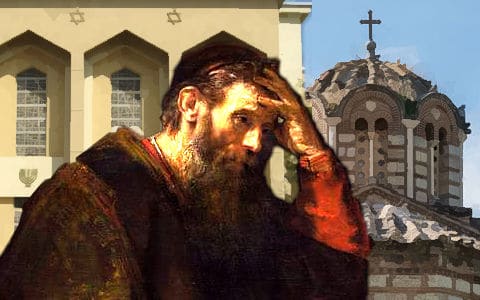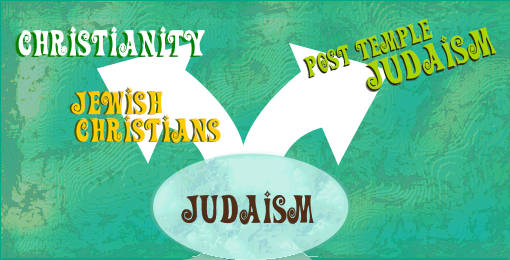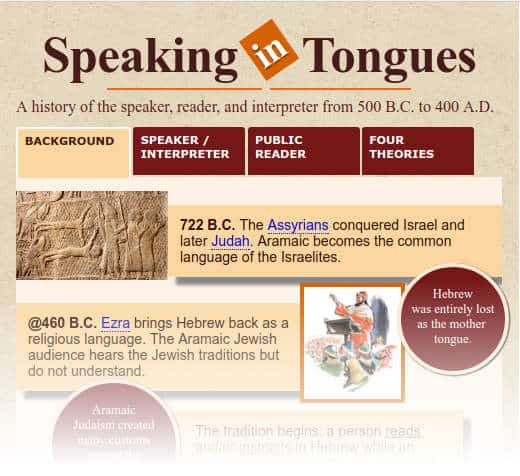Why Paul never used the word synagogue to describe the movement he inspired and chose ecclesia instead—the Greek word we translate as church.
The short answer is that he couldn’t use the word synagogue for a variety of legal and administrative reasons. Ecclesia was a better fit for their role as a para-synagogue organization within the Jewish umbrella.
There is a second option but not so strong as the first one. Paul thought of ecclesia as defining his concept of Messianic Judaism a restorative movement claiming back to the time of Ezra.
Jewish
Christianity's Big Split from Judaism
The reasons and impact of Christianity’s separation from its Jewish parent.
Christianity started as a grass-roots Jewish movement that had its origins in the Galilee and Jerusalem regions.
There were two reasons that this offspring of a Jewish parent split: the destruction of Jerusalem, and their excommunication by Rabban Gamaliel II. This separation was distinct by the time of the Bar Kokhba revolt.
One must keep in mind that the separation was a gradual one. There were amicable relations between the two parties for centuries—so close that it caused competing interests.
The Dead Sea Scrolls, Jesus, and Paul
Capturing the spirit of first-century Judaism through the window of the Dead Sea Scrolls and the New Testament writings.
The Dead Sea Scrolls give an important look into first-century Jewish life from a mainly Jewish-Hebrew perspective; a genre lacking until their advent. Most of our extra-biblical knowledge of Israel during the first-century was previously drawn from Jewish Greek and Aramaic writers.
Tongues of Corinth Infographic
A history of speaking, interpreting, and reading from 500 B.C. to 400 A.D. in Judaism and early Christianity.
An interactive infographic to help you navigate Paul’s world and how these offices later evolved in the Christian Church. Clicking on the image will bring you to the full interactive site.
IMPORTANT! Please note that the interactive file was an experiment in coding and design. The end result is that you have to wait a bit longer before the file is rendered, especially on mobile phones. My apologies in advance.
Paul’s mention of speaking in tongues in I Corinthians is deeply wrapped in the Jewish identity. The same goes for his understanding of speaking, reading, and interpreting of tongues. These rites have a rich history that goes well over 800 years. The initial origins are deeply connected to the times of Ezra.
The role of Hebrew in the Jewish-Aramaic World
The influence of Aramaic and Hebrew on Jewish life around the first-century.
The goal of any information gleaned from this inquiry is to find a possible connection with Hebrew being a part of the first-century Corinthian liturgy. A subsequent purpose is to confirm or deny an assertion by the fourth-century Bishop of Salamis, Epiphanius, that the mystery tongues of Corinth had its roots in the Hebrew language.
We cannot assume any synagogue outside of Israel, let alone Corinth, used the Hebrew language as part of their religious service. So, it requires digging deeper into the relationship between Hebrew and Aramaic to find answers.
A Jewish-Greek Perspective on the Tongues of Corinth
The following is a journey into identifying speaking in tongues through Hebrew and Greek Jewish traditions. This is an introduction to a series of articles devoted to this subject. Researching Jewish traditions about speakers and interpreters has uncovered two very important customs that are so close to Paul’s narrative that it would be hard to …
The Public Reader in the Church
The role of the public reader in the earliest diasporan Church, how the language changed over time, and the new problems it created.
The Journey out of Christian Zionism
Why I am no longer pro-Israel, nor pro-Arab, but pro-human.
The story about a Canadian Evangelical and apocalyptic Christian studying in Israel. How reality confronted imagination and stereotypes and won.
As my wife and I unbuckled our seatbelts on El-Al airliner and looked out the window, our imaginations ran wild. Little did we know the emotional and intellectual challenges that lay ahead.
We were on a one-year scholarship to attend the Hebrew University of Jerusalem in 1984. The stay in Israel was after three years of Bible College training. It was exciting to live and study in the actual place where most of the Biblical writings took place.
The Alliance between Israel and Evangelicals
The financial, political, social and religious relationships between the nation of Israel and Evangelical groups abroad.
Death, Religion and the Modern Man
A look at death from contemporary, religious, philosophical, and personal perspectives.
Death is the one question that modern science still has yet to answer in the most preliminary way. Religion answers questions about death, but this is largely ignored. Philosophy touches on the subject, but this falls short.
In modern western society, our thoughts on the subject are so thoroughly deficient, that we are not only unprepared, we emotionally flee.
It also produces many outcomes in the modern mind which are mainly on the subconscious level.



